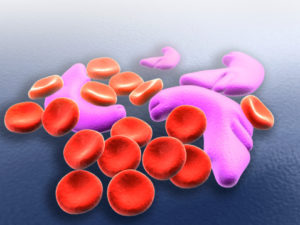Simple and exchange blood transfusions are standard care for prevention of recurrent strokes in patients with sickle cell anemia. Blood transfusions reduce the number of sickle cells in circulation and thus improve oxygenation and blood rheology.
Problems arise, however, when children transition to adult care; not all adults are compliant with treatment. Researchers followed 22 sickle cell patients between the age of 18 and 28 that had a history of overt strokes while transitioning to adult care. Non-compliance and refusal of blood transfusions occurred among 8 patients, and was associated with death within 1-5 years from stroke or multi-organ failure. The 14 compliant patients were rarely hospitalized for serious conditions, although some did experience alloimmunization (7/14) and iron overload (11/14) complications from blood transfusions. Young adults with sickle cell anemia should be highly encouraged to continue chronic (simple or exchange) blood transfusions when transitioning to adult care.
Reference
 Transfusion offers CME credit for this study! Log on at www.wileyhealthlearning.com/trf.
Transfusion offers CME credit for this study! Log on at www.wileyhealthlearning.com/trf.


Thank you for posting the link to the CME/SAM content! This helps keep me up to date for my ABP MOC.
In view of the increasing popularity, research and development in the field of bloodless medicine, are there any alternatives to blood in the care and management of Sickle cell disease, sickle cell anaemia and its attendant complications.
Thank you very much for the articles.